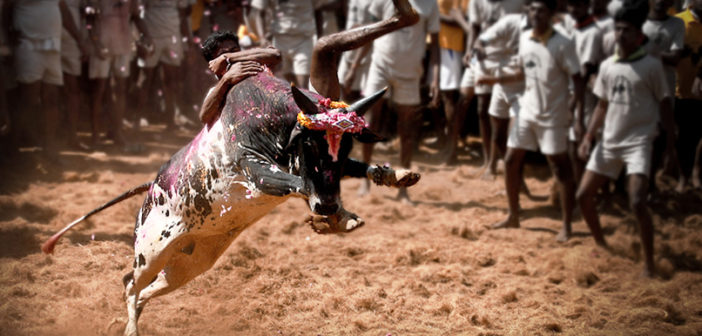The Madurai District administration’s recent decision to make Aadhaar identification mandatory for all bull tamers participating in Jallikattu could not have come at a better time. With annual Jallikattu ‘celebrations’ starting from the 14th of January, this interim decision will go a long way in limiting the participation of bull tamers, and in some cases, the accidental death of humans and bulls alike. The decision also places greater liability on participants, who will now be unable to send ‘proxy players’ to play in their stead.
This timely win is, however, bittersweet. The Aadhaar project, which collects biometric data and assigns a 12-digit identification number to each person, shreds the very ideas of privacy and civil liberty, allowing unlawful surveillance by countless government and non-government bodies and opening a dangerous gateway to tyranny. Nonetheless, today it serves as a gatekeeper to Jallikattu, itself a tyrannical practice committed against animals in the name of tradition.
While the news has certainly not gone down well with the locals, this new impediment seems to be another step toward the eventual end of the ‘tradition’ of Jallikattu. For anyone outside the purview of animal activism, Jallikattu makes for an interesting case study on the crossroads where culture and civility conflict.
Here’s how the events transpired in a nutshell. In 2011, India’s Ministry of Environment, Forest, and Climate Change passed a notification banning the use of bulls as performing animals, thereby prohibiting Jallikattu. Bull taming events continued, however, under the Tamil Nadu Regulation of Jallikattu Act of 2009, until the Supreme Court struck down the state law in 2014, banning Jallikattu altogether. Following massive protests by supporters of Jallikattu in January 2017, the Tamil Nadu government enacted a state law that allows the practice to continue for now. The law is currently under challenge at the Supreme Court by various animal organisations, including FIAPO, and a constitution bench is going to look into the validity of such laws.
With all the heated drama and political and cultural factors at play, the battle between the state and federal governments, the judiciary, animal activists, Jallikattu enthusiasts, and defenders of Tamil “tradition” is still far from over. However, the conflict itself reflects a change in our collective conscience. The moral and cultural compass of our civilisation has shifted away from accepting barbarism as tradition or sport, broadening the horizon of what we perceive as unjust.
The past few years are replete with examples. In 2011, Catalonia became the first Spanish city to ban bullfighting. Ringling Bros. and Barnum & Bailey’s Circus announced in 2015 that they planned to retire their circus elephants, and closed down altogether last May. Mexico has banned the use of exotic animals for entertainment, and in 2016 SeaWorld also announced the end of orca breeding and performances.
That more and more governments and companies are ending the use of animals in entertainment points to the archaic nature of such practices, whose time is nearing an inevitable end. Hopefully, a decade or two from now, we will be able to view animal entertainment as a relic of previous centuries. Until then, let’s keep our marching hats on and continue fighting the battle against Jallikattu in the days to come.
Varda Meherotra,
Director,
Federation of Indian Animal Protection Organisations (FIAPO)
Featured image credit Iamkarna’, CC BY 3.0





